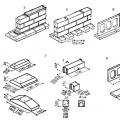Engineers are workers who deal with various technical devices. The basis of their activities is focused on modernizing or optimizing the solutions that currently exist. Beginners in this business are engaged only in direct observation or adjustment of technical devices.
Depending on the category of engineers, workers have different access to technologies, units or equipment. They also have different rights and responsibilities. Accordingly, as the category grows, the range of work performed will increase, as well as
Superficial division of engineers into categories
In domestic practice, there are the following categories of engineers:
- Lack of category. Workers with this specialization will be able to perform only the simplest actions. Moreover, they cannot make any decisions unless they are supervised by more qualified professionals.
- Category 3. Such workers can perform the responsibilities of engineers described above. In addition, they can develop simple drawings. Naturally, they will perform all work only under the strict supervision of specialists of higher categories.
- 2nd category. Workers cope with the responsibilities listed above, without the supervision of professionals. In addition, they have access to the development of drawings for individual parts or small simple assemblies. In some cases, designers independently assemble such parts according to the created drawings.
- 1st category. The employee performs all of the above actions. In addition, if the manager gives certain instructions for the creation of new units, then the engineers can and are obliged to carry them out.
The leading engineer can also be noted. He is involved in the development of all major structures that are used at the enterprise. Plus, they can optimize existing systems and units and develop equipment that will become more competitive.
Engineers category 3
A category 3 engineer is a performer who carries out orders and instructions from senior management. Usually the role of the latter is played by more qualified specialists. that the engineer performs the bulk of his work under close supervision, he can do some actions independently:
- Choose auxiliary materials that will be more convenient for him to use.
- Independently improves his skills and studies the necessary materials.
- Develops documentation and signs it before handing it over to the manager.
Thus, despite limited obligations, all category 3 engineers represent an independent working unit that needs to coordinate its actions with specialists.
Engineers 2nd category
An engineer of category 2, when performing his activities, must be guided by the regulatory documents of the organization in which he works. He is also responsible for other documentation.

As a rule, the main job of category 2 engineers is to receive tasks from higher management, then divide them among subordinates. But in addition to this, he needs to coordinate documentation and activities with other departments. Naturally, an engineer cannot deviate from instructions given by more qualified specialists.
Engineers 1st category
A category 1 engineer has many more rights and responsibilities. As his responsibility increases, so does wage. He may have appropriate employees subordinate to him, the specific specialization of which will be determined by the direction of activity of the engineer and the enterprise.
- Failure to fulfill or improper performance of one’s official obligations. In addition, if the engineer’s subordinates do not fulfill their obligations, the manager will be held responsible.
- Offenses committed during labor activity. For example, if safety precautions were not followed during work, the engineer will be held liable. This applies even to those cases where no one was harmed during a TB violation.
- Causing material damage to the enterprise.

Naturally, this amount of commitment pays off high salary, because otherwise no one will want to take on such responsibility.
Assigning categories
The assignment of a category to an engineer is carried out based on the results of certification. Typically, the timing will be set by government agencies, but sometimes large companies or businesses will hire independent panels when they believe one or more workers could improve their skills. Otherwise, the following engineers can count on increased professionalism:
- Category 3 is submitted by a specialist who has higher education and at least 3 years of experience.
- Category 2 is applied for by a specialist who has a higher education and has at least 3 years of experience as a category 3 employee.
- Category 1 is applied for by a specialist who has a higher education and has at least 3 years of experience as a category 2 employee.
Thus, the assignment of a category to an engineer is carried out every three years. Sometimes this time is reduced to 2 years if the specialist worked in difficult conditions or temporarily performed the duties of an employee with higher qualifications. Of course, provided that he coped with his activities perfectly.
Job responsibilities of process engineers
Any process engineer (categories and work experience do not matter) is engaged in introducing new technologies into the standard, well-established production process at the enterprise. All his actions will be focused on two basic rules:
- Reducing the cost of production.
- Increasing productivity in a competitive environment.

Since the work of a technologist is directly related to the company’s activities, management must constantly keep him informed of any changes, especially those related to his field.
Each process engineer of categories 1, 2, 3 and without it must have certain knowledge. They include legislative acts, GOST standards for equipment and products, information software, enterprise computer equipment, and so on.
Job responsibilities of design engineers
Designers work with equipment, drawings and tools. Such an engineer must have an excellent understanding of circuits and devices. If necessary, he will have to adjust them, modernize them, or draw up such drawings that will allow other workers to assemble a more modern and technologically advanced device. It is impossible to specifically identify the responsibilities of designers, since they will depend on the specifics of the enterprise, as well as on the narrow profile of its specialization.
There are 3 categories of design engineers. Each of them, accordingly, allows you to work at different levels. During the implementation of its activities, the designer uses the following:
- Drawing tools.
- Specially created or developed software.
- Directly personal computers.
- Automation tools.

Sometimes such engineers are allowed to use other tools. But the main weapon of an employee is his experience and professionalism.
Job responsibilities of design engineers
All categories of design engineers are involved in the development of entire projects or individual parts, it all depends on qualifications. The following elements can be used during operation:
- Technologies.
- Personal experience.
- Automation tools.
- Various domestic or foreign modern devices.

Regardless of the category of design engineers, the relevant employees must have a large amount of knowledge. They include any design technologies, as well as technical calculations and methods for carrying them out. It is impossible not to note the standards and GOSTs, which are on a par with safety. Any outside knowledge is welcome, but will not necessarily be paid for by management.
Engineers' rights
- Offer to management various ways, which will help improve working conditions and make them more organized.
- Use scientific literature and materials that will help you cope with your responsibilities. That is, any engineer does not have to memorize all the information; from time to time he can use books or magazines.
- Pass certification in accordance with the procedure established by the enterprise or state. In the process, they may receive new category, as well as remaining at the same level of qualifications.
- Improve your qualifications with all the ensuing consequences. That is, after receiving a new category, the employee has the right to a higher salary, Better conditions labor, new entries in labor books, and so on.

In addition to those listed above, engineers have the opportunity to enjoy all the rights that are specified in the Labor Code of the country where their work activities are carried out.
Engineers' responsibilities
- Timely completion of duties.
- Organization of personal work activities, execution of orders and assignments at the appointed time.
- Compliance with fire safety rules, as well as the regulations established at the enterprise.
- Maintaining documentation detailing the engineer’s activities.
- If there are employees subordinate to them, then the manager will be directly responsible for their failure to fulfill their duties.
- If safety precautions were violated during work, the engineer is obliged to take action and also inform management in a timely manner.
If it is violated, the engineer will bear the responsibility established by law. It will depend on the severity of the offense. For example, an employee may be forced to pay a fine, work, arrest or deprivation of property.
Conclusion
It is known what categories of engineers exist today. However, in order to truly be in good standing with your superiors, as well as earn large sums of money, you need to work and study a lot. Otherwise, neither experience nor attempts to obtain a new category will help improve your specialization. In addition, it is recommended to monitor the release of new regulations, technologies and scientific literature. Engineers are one of the few workers who are required to monitor modern discoveries, since otherwise they will lose their competitiveness.
Unified qualification directory for positions of managers, specialists and other employees (UN), 2019
Qualification directory for positions of managers, specialists and other employees
Sections « Industry-wide qualification characteristics of positions of workers employed in enterprises, institutions and organizations" And " Qualification characteristics of positions of employees employed in research institutions, design, technological, design and survey organizations", approved by Resolution of the Ministry of Labor of the Russian Federation dated August 21, 1998 N 37
(edited on May 15, 2013)
| Design engineer (constructor) |
Laboratory engineer
Job responsibilities. Manages or conducts laboratory analyses, tests and other types of research on raw materials, semi-finished products, materials, structures and finished products to determine compliance with applicable specifications and standards. Performs experimental and research papers to find more economical and effective methods production, as well as laboratory production control. Performs the necessary calculations based on the analyzes, tests and studies carried out, analyzes the results obtained and systematizes them. Takes part in the development of technological processes and their research during the development period, in the development and implementation of standards and technical specifications on raw materials, semi-finished products, materials used in production, as well as in establishing progressive standards for their consumption. Based on the study of advanced domestic and foreign experience in conducting laboratory research The enterprise develops new and improves existing methods of conducting laboratory tests, testing and research, provides assistance in their development. Investigates the causes of defects in production and takes part in the development of proposals for their prevention and elimination. Develops measures for the integrated use of raw materials, replacement of scarce materials and seeks ways to dispose of production waste. Monitors the correct operation of laboratory equipment and its timely submission for periodic state verification.
Must know: production technology; laboratory equipment and rules of its operation; technical requirements requirements for raw materials, materials and finished products; standards, regulations, instructions and other guidance materials on technological preparation of production, laboratory control and preparation of technical documentation; methods of conducting research work and organizing laboratory control of production; modern means computing, communications and communications; experience of advanced domestic and foreign enterprises in the field of production technology of similar products; rules and regulations of labor protection.
Qualification requirements.
Laboratory engineer: higher vocational (technical) education without requirements for work experience or secondary vocational (technical) education and work experience as a laboratory technician of category I for at least 3 years or other positions filled by specialists with secondary vocational (technical) education , at least 5 years.
font size
QUALIFICATIONS DIRECTORY OF POSITIONS FOR MANAGERS OF SPECIALISTS AND OTHER EMPLOYEES (approved by the Resolution of the Ministry of Labor of the Russian Federation dated... Relevant in 2018
LABORATORY TECHNICIAN
Job responsibilities. Performs laboratory analyses, tests, measurements and other types of work during research and development. Participates in the collection and processing of materials during the research process in accordance with the approved work program. Monitors the good condition of laboratory equipment and adjusts it. Prepares equipment (instruments, equipment) for experiments, carries out its checks and simple adjustments in accordance with developed instructions and other technical documentation. Participates in experiments, carries out the necessary preparatory and auxiliary operations, conducts observations, takes instrument readings, and maintains work logs. Provides department employees with the equipment, materials, reagents, etc. necessary for work. Processes, systematizes and draws up the results of analyzes, tests, measurements in accordance with methodological documents, and keeps records of them. Selects data from literary sources, abstracts and information publications, regulatory and technical documentation in accordance with the established task. Performs various computational and graphical work related to ongoing research and experiments. Participates in the preparation and execution of technical documentation for the work performed.
Must know: guidelines, normative and reference materials related to the topic of work; methods of analysis, testing and other types of research; current standards and technical specifications for the technical documentation being developed, the procedure for its preparation; laboratory equipment, control and measuring equipment and rules of its operation; methods and means of performing technical calculations, computational and graphic work; basics of economics, organization of labor and production, rules of operation of computer technology; basics of labor legislation; internal labor regulations; rules and regulations of labor protection.
Qualification requirements. Average professional education without presenting requirements for work experience or initial vocational education and work experience in the specialty of at least 2 years.
We bring to your attention a typical example of a job description for a laboratory engineer, sample 2019/2020. should include the following sections: general regulations, job responsibilities of a laboratory engineer, rights of a laboratory engineer, responsibility of a laboratory engineer.
Job description laboratory engineer belongs to the section " Industry-wide qualification characteristics of positions of workers employed in enterprises, institutions and organizations".
The job description of a laboratory engineer should reflect the following points:
Job responsibilities of a laboratory engineer
1) Job responsibilities. Directs or conducts laboratory analyses, tests and other types of research on raw materials, semi-finished products, materials, structures and finished products to determine compliance with applicable specifications and standards. Performs experimental and research work to find more economical and efficient production methods, as well as laboratory control of production. Performs the necessary calculations based on the analyzes, tests and studies carried out, analyzes the results obtained and systematizes them. Takes part in the development of technological processes and their research during the development period, in the development and implementation of standards and technical specifications for raw materials, semi-finished products, materials used in production, as well as in establishing progressive standards for their consumption. Based on the study of advanced domestic and foreign experience in conducting laboratory research at the enterprise, he develops new and improves existing methods for conducting laboratory analyzes, tests and research, and provides assistance in their development. Investigates the causes of defects in production and takes part in the development of proposals for their prevention and elimination. Develops measures for the integrated use of raw materials, replacement of scarce materials and seeks ways to dispose of production waste. Monitors the correct operation of laboratory equipment and its timely submission for periodic state verification.
A laboratory engineer must know
2) When performing his job duties, a laboratory engineer must know: production technology; laboratory equipment and rules of its operation; technical requirements for raw materials, materials and finished products; standards, regulations, instructions and other guidance materials on technological preparation of production, laboratory control and preparation of technical documentation; methods of conducting scientific research work and organizing laboratory control of production; modern means of computing, communications and communications; experience of advanced domestic and foreign enterprises in the field of production technology of similar products; rules and regulations of labor protection.
Requirements for the qualifications of a laboratory engineer
3) Qualification requirements.
Engineer - laboratory assistant of category I: higher professional (technical) education and work experience as an engineer - laboratory assistant of category II for at least 3 years.
Laboratory engineer category II: higher professional (technical) education and work experience as a laboratory engineer for at least 3 years.
Laboratory engineer: higher vocational (technical) education without requirements for work experience or secondary vocational (technical) education and work experience as a laboratory technician of category I for at least 3 years or other positions filled by specialists with secondary vocational (technical) education , at least 5 years.
1. General Provisions
1. A laboratory engineer belongs to the category of specialists.
2. A laboratory engineer is a person who has a higher professional (technical) education without presenting requirements for work experience or a secondary vocational (technical) education and work experience as a laboratory technician of category I for at least 3 years or other positions filled by specialists with a secondary education. professional (technical) education, at least 5 years.
3. A laboratory engineer is hired and dismissed _______ (director, manager) organization on behalf of _______ (position).
4. The laboratory engineer must know:
- production technology;
- laboratory equipment and rules of its operation;
- technical requirements for raw materials, materials and finished products;
- standards, regulations, instructions and other guidance materials on technological preparation of production, laboratory control and preparation of technical documentation;
- methods of conducting research work and organizing laboratory control of production;
- modern means of computing, communications and communications;
- experience of advanced domestic and foreign enterprises in the field of production technology of similar products;
- rules and regulations of labor protection.
5. In his activities, the laboratory engineer is guided by:
- legislation Russian Federation,
- Charter (regulations) of the organization,
- orders and instructions ______ (general director, director, manager) organizations,
- this job description,
- Internal labor regulations of the organization.
6. Laboratory engineer reports directly to: ______ (position).
7. During the absence of a laboratory engineer (business trip, vacation, illness, etc.), his duties are performed by a person appointed _______ (position) of the organization in the prescribed manner, who acquires the corresponding rights, duties and is responsible for the performance of the duties assigned to him.
2. Job responsibilities of a laboratory engineer
Laboratory engineer:
1. Manages or conducts laboratory analyses, tests and other types of research on raw materials, semi-finished products, materials, structures and finished products to determine compliance with applicable technical specifications and standards.
2. Performs experimental and research work to find more economical and efficient production methods, as well as laboratory control of production.
3. Carry out the necessary calculations based on the analyzes, tests and studies carried out, analyze the results obtained and systematize them.
4. Participates in the development of technological processes and their research during the development period, in the development and implementation of standards and technical specifications for raw materials, semi-finished products, materials used in production, as well as in establishing progressive standards for their consumption.
5. Based on the study of advanced domestic and foreign experience in conducting laboratory research at the enterprise, develops new and improves existing methods for conducting laboratory analyses, tests and research, and provides assistance in their development.
6. Investigates the causes of defects in production and takes part in the development of proposals for its prevention and elimination.
7. Develops measures for the integrated use of raw materials, replacement of scarce materials and seeks ways to dispose of production waste.
8. Monitors the correct operation of laboratory equipment and its timely submission for periodic state verification.
3. Rights of a laboratory engineer
The laboratory engineer has the right:
1. Submit proposals for management’s consideration:
- to improve work related to those provided for in this instructions and duties,
- on the encouragement of distinguished employees subordinate to him,
- on bringing to material and disciplinary liability workers who violated production and labor discipline.
2. Request from structural divisions and employees of the organization the information necessary for him to perform his job duties.
3. Get acquainted with the documents defining his rights and responsibilities for his position, criteria for assessing the quality of performance of official duties.
4. Get acquainted with the draft decisions of the organization’s management relating to its activities.
5. Require the management of the organization to provide assistance, including ensuring organizational and technical conditions and execution of the established documents necessary for the performance of official duties.
6. Other rights established by current labor legislation.
4. Responsibility of the laboratory engineer
The laboratory engineer is responsible in the following cases:
1. For improper performance or failure to fulfill one’s job duties provided for in this job description - within the limits established by the labor legislation of the Russian Federation.
2. For offenses committed in the course of their activities - within the limits established by the current administrative, criminal and civil legislation of the Russian Federation.
3. For causing material damage to the organization - within the limits established by the current labor and civil legislation of the Russian Federation.
Job description for laboratory engineer - sample 2019/2020. Job responsibilities of a laboratory engineer, rights of a laboratory engineer, responsibility of a laboratory engineer.
Job responsibilities. Directs or conducts laboratory analyses, tests and other types of research on raw materials, semi-finished products, materials, structures and finished products to determine compliance with applicable specifications and standards. Performs experimental and research work to find more economical and efficient production methods, as well as laboratory control of production. Performs the necessary calculations based on the analyzes, tests and studies carried out, analyzes the results obtained and systematizes them. Takes part in the development of technological processes and their research during the development period, in the development and implementation of standards and technical specifications for raw materials, semi-finished products, materials used in production, as well as in establishing progressive standards for their consumption. Based on the study of advanced domestic and foreign experience in conducting laboratory research at the enterprise, he develops new and improves existing methods for conducting laboratory analyzes, tests and research, and provides assistance in their development. Investigates the causes of defects in production and takes part in the development of proposals for their prevention and elimination. Develops measures for the integrated use of raw materials, replacement of scarce materials and seeks ways to dispose of production waste. Monitors the correct operation of laboratory equipment and its timely submission for periodic state verification.
Must know: production technology; laboratory equipment and rules of its operation; technical requirements for raw materials, materials and finished products; standards, regulations, instructions and other guidance materials on technological preparation of production, laboratory control and preparation of technical documentation; methods of conducting research work and organizing laboratory control of production; modern means of computing, communications and communications; experience of advanced domestic and foreign enterprises in the field of production technology of similar products; rules and regulations of labor protection.
Qualification requirements.
Laboratory engineer category II: higher professional (technical) education and work experience as a laboratory engineer for at least 3 years.
Laboratory engineer: higher vocational (technical) education without requirements for work experience or secondary vocational (technical) education and work experience as a laboratory technician of category I for at least 3 years or other positions filled by specialists with secondary vocational (technical) education , at least 5 years.




